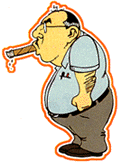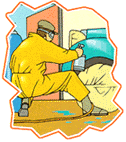When Michael E. Gerber first introduced the world to the e-myth principles in his seminars, consulting services and books, it may have seemed odd to relate such ideas to the collision repair industry. But if you’ve had the opportunity to read — or listen to the audio version of — his updated, "The E-Myth Revisited: Why Most Small Businesses Don’t Work and What to Do About It," you’ll quickly see the message relates directly to our industry. In fact, it cuts to the very core of most of our business problems.
My staff and I work with clients all over the world, and Gerber’s book is required reading for both my clients and my team. Why? It’s not because the book’s main example of a pie-making company is riveting or inspirational. Rather, it’s because the same strife the example business faces is what all small-business owners must overcome to grow and to move to the next level in their business development. This is especially true with the collision repair industry.
What’s an E-Myth?
Many people ask if "e-myth" relates to e-commerce, e-business, the electronic age or energy. No, the "e" stands for "entrepreneur." It’s a great start to understanding why the harder you seem to work, the less you accomplish; why you continually struggle to expand your business to the point where you’re not directly responsible for everything; and why this all occurs. It seems like a perfect place to start for the collision repair industry today.
We’ve worked with shops of various sales volumes worldwide. Some just break $250,000 a year while others do more than $9 million. Despite the sales volume, the same problems exist with this basic principle — the e-myth.
The purpose of this article isn’t for you to visit our Web site and purchase the book or audio tapes (though you should if you don’t already own a copy). It’s to explain how the principles relate to the collision repair industry.
The e-myth is about entrepreneurs and is basically how the struggle takes place each day within the owner(s) mind and in actions that effect the business’ future and growth.

The Struggling Partners
Business owners wear many hats each day. They also have "internal business partners" who co-exist in their minds. These partners divide the "hats" among three definite psyches: the entrepreneur, the manager and the technician. But they also battle each other as you handle daily problems and determine your business’ direction. They each have unique qualities that complement the others, but each may also attempt to dominate, which can hinder business growth.
- The entrepreneur — This is the spirit that drove you into business —the spark that said you didn’t need to work for "him" any longer, that you could do it better. (Remember that feeling of "take this job and shove it"?) It’s the "sales persona" that got it all started.
Some small business owners look back now and realize that it isn’t as easy as it seemed at that moment. Others look at it as the best decision they ever made. Your entrepreneurial spirit drives such decisions — so blame this part of your business psyche if you think making a business work is harder than you originally thought.
This part of your psyche is also critical to taking risks and making changes. Your entrepreneur spirit allows you to see those opportunities and make the necessary changes to keep ahead.
But beware; the same spirit can lead to chaos, unfinished projects, budget-busting expenses, staff problems and, ultimately, failed business ventures. If this spirit dominates, it’s the perfect example of "seat of your pants" management. This is why it’s important to know when to use these traits and when to avoid them during the cycle of business growth.
- The manager — This portion of your psyche looks at business operations and wants order and accountability. The processes you’ve successfully implemented come from this internal partner. It also "hates" when the entrepreneur makes decisions, since it must usually clean up the mess once the direction is set.
The manager in you doesn’t take risks without documentation, accurate financial information and a plan. That means the entrepreneur spirit has little patience for the methodical process the manager wishes to practice.
Yet this psyche is critical to small business growth. The ability to set and follow systems and to delegate is the only way a small business can succeed and grow. Otherwise, the business owner will explode!
But if this area becomes too dominant, it may hinder a small-business owner from taking advantage of opportunities and making necessary changes because the manager psyche likes systems and procedures to stay the same. We’ve had many clients who’ve built systems that are inflexible and can’t meet the changing needs of the business.

- The technician — This portion of your psyche is the key to your early success and probably the biggest detriment to your future. We’ve found many of our clients have this psyche as their greatest strength and, by far, their greatest weakness.
This psyche understands the processes of your service inside and out. It looks at every operation as if it were to perform them. The tendency of this psyche, if it dominates business decisions, is to purchase the most technologically advanced tools and equipment, while the front office computers are old Pentiums (or even worse, Unix boxes), the telephones are so ancient even Alexander Graham Bell would recognize them and the office looks like your teenager’s bedroom. This psyche’s response to updating equipment is, "If it can’t make me more money while fixing the car, it isn’t worth it!" This belief will always hinder the growth of the business at a certain point in its life cycle.
Today, owners need to look at the collision repair business as a sales organization first, not a service organization first. To the technician psyche, this isn’t easy to accept. The technician inside you remembers when you performed the work, wrote the estimates, delivered the vehicles and did all the paperwork. To this psyche, the most important objective is to repair the vehicle.
Common traits driven by the technician psyche include:
- not purchasing a management system.
- not purchasing another estimating system (so balancing doesn’t take hours).
- not buying a digital camera.
- not participating in local trade associations and events.
- not participating in local community associations and boards.
- not establishing a solid accounting system and getting timely reports.
- having tremendous staff turnover (especially production employees).
- working too many hours (70+ week after week, year after year) without a vacation.
- being frustrated with the business and how complex it’s become.
- refusing to partake in any direct-repair relationship.
- believing that sales volume can’t be increased without sacrificing quality.
- denying that systems can be implemented to improve the processes.
When the business was first formed, the technician psyche was what made it survive. Now it may be the cause of its failure. This has been our No. 1 challenge while working with clients worldwide. If you can’t make this transition, your business may not survive the changes to come.

Solutions Are There … If You Look
Every day, we’re faced with challenges that require a specialist to perform a service. We see this many times during the repair process. There may be a frame specialist who performs his service, as well as a glass company, an electronics expert, a mechanical specialist and a laundry list of others who complete the total claims process. It’s easy for the technician psyche to understand the need for specialists in the repair process. But it’s not so clear to many business owners when a specialist is needed to assist in running the business.
As mentioned earlier, reading books or listening to audio tapes is one way to get help running your business. The information you learn can head you in the right direction. Seminars are also great educational tools and can be very valuable to you and your key staff. When I refer to seminars, I’m not referring to the normal technical seminars to which you probably send your technicians, but to the business development and management seminars that are offered by paint vendors and other industry sources. In our work, we’ve found that once we get the owner and key staff to our seminars, they begin to understand the frustrations they’re having and to see the big picture of the business. They begin to unravel the e-myth.
Does your staff cringe every time you tell them you’re reading a new business book or attending a business seminar? That’s probably because they’ve seen it all before. They know that soon you’ll be coming in to "change their world." They also know that if they just play along for about a week, things will eventually return to the way they’ve always been.
Why are these new ideas and important changes short-lived without additional assistance from a consultant or a business coach? Without a coach to motivate employees and direct the change, the business will naturally revert back to its former state.
That’s why good coaching is needed. Even the best athletes in the world have coaches. In most cases, it makes the difference between being champions or just being athletes. Your needs as a business owner are no different.
Making operational changes will generally require a good business coach (consultant) to set strategies, implement the changes, train your staff and perform accountability assessments on a regular basis. This is a process that’s often overlooked, meaning good ideas never materialize into permanent changes. It’s amazing how much can be done to improve a business, but how often the opportunities are missed.
Dispelling the Myth
Today, personally repairing the vehicle, turning a wrench or baking a pie — like in the business example in "The E-Myth Revisited" — is much less important than whether you can see your business future (vision) clearly, train people to do it "your way," get sales in the door and maintain a high customer-satisfaction index.
To accomplish these business objectives requires systems (from your manager psyche), sales skills (from your entrepreneur psyche) and vision — being able to see available opportunities and then act upon them. Unfortunately, the technician psyche locked in every collision shop owner often gets in the way.
A phrase we often use to improve clients’ businesses is, "You must be able to work on your business rather than in your business." To accomplish this requires understanding the three psyches and realizing that if the technician dominates, you’ll always be working in your business.
Contributing editor Tony Passwater is president of AEII, a consulting, training and system-development company. He’s been in the industry for more than 27 years; has been a collision repair facility owner, vocational educator and I-CAR international Instructor; and has taught seminars across North America, Korea and China. He can be contacted at (317) 290-0611, ext. 101, or at ([email protected]). Visit his Web site at www.aeii.net for more information.













